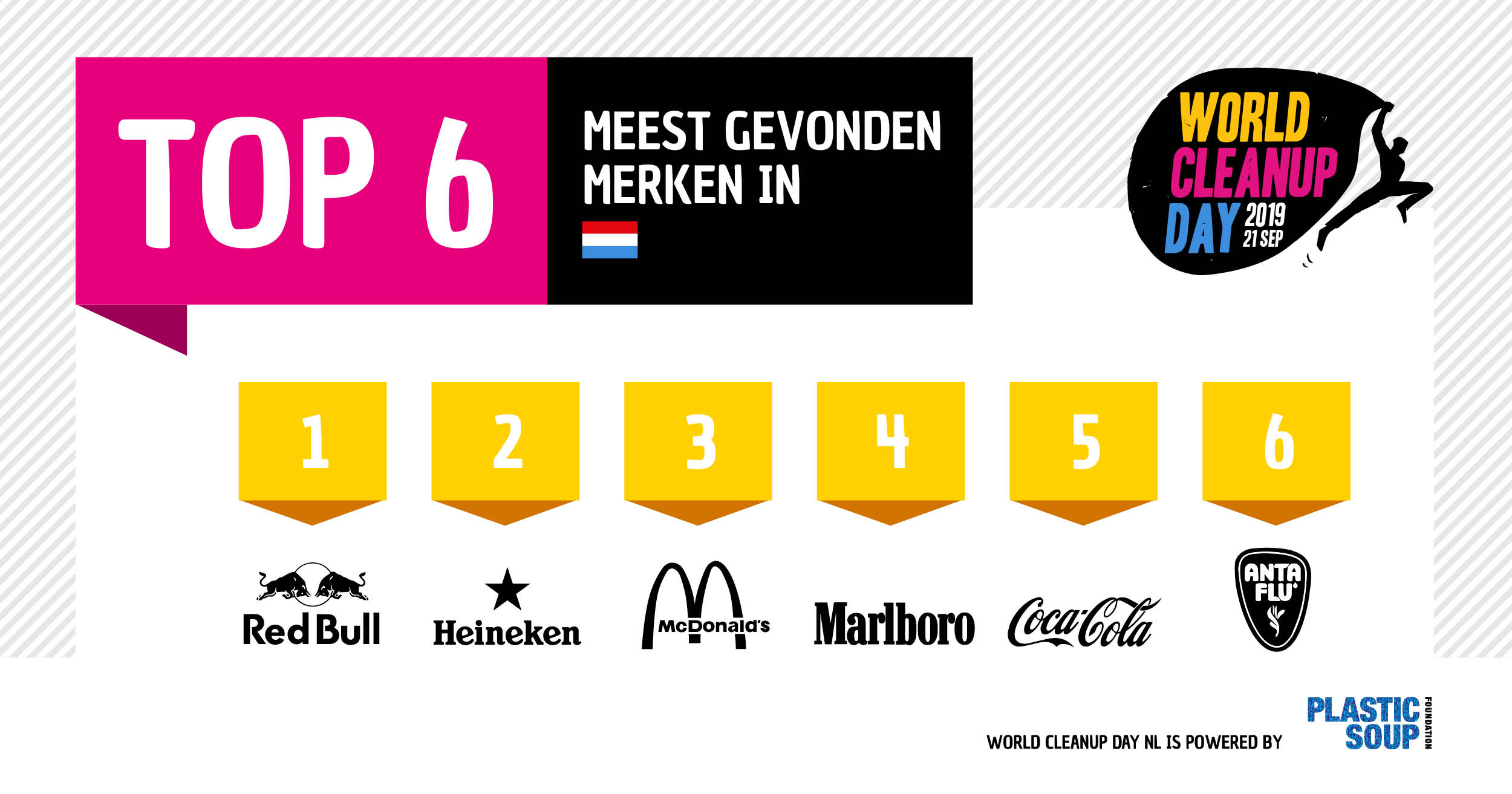Amsterdam, 25 October 2019 – Coca-Cola once again proves to be the world’s largest plastic polluter. Just like in 2018, World Cleanup Day not only cleaned up but also recorded which brands were found in the streets. Brand audits were carried out by over 72,000 volunteers in 51 countries. In total, almost 500,000 pieces of plastic waste were disposed of. In 43% of the cases, it was possible to determine which company had produced which packaging. For Coca-Cola, this was 11,732 items in 37 countries.
Brand Audit compared to 2018
In 2019, seven times as many volunteers participated in brand tally and the number of cleanups/brand audits increased from 239 to 484. This makes the data for 2019 a lot more robust. The top three appear to consist of the same multinationals as in 2018: Coca-Cola, Nestlé and PepsiCo. The analysis method in 2019 differed slightly from the previous year. This year, not only the most polluting companies were shown, but the number of countries in which the items were found has also been taken into account for the ranking. The top ten consists of:
– 1 Coca-Cola (2018: 1)
– 2 Nestlé (2018: 3)
– 3 PepsiCo (2018: 2)
– 4 Mondelez International (2018: 5)
– 5 Unilever (2018: 7)
– 6 Mars (2018: 9)
– 7 Procter &Gamble (2018: 6)
– 8 Colgate-Palmolive (2018: 10)
– 9 Phillip Morris (2018, not mentioned)
– 10 Perfetti Van Melle (2018: 8)
Danone, in 2018 at number 4, is no longer mentioned in 2019.
The Brand Audit 2019 was published by Greenpeace Philippines and was organized by Break Free From Plastic. In the Netherlands, World Cleanup Day was organized by the Plastic Soup Foundation on 21 September. The Dutch results have been incorporated into the report. The top six most found brands in the Netherlands are:

Citizen Science
The analysis is a fine example of citizen science. Thanks to the size of the brand audits, we have reliable data at our disposal. Countries in the south of the world (the global south) are often accused of making a disproportionately large contribution to the plastic soup. The data from the Brand Audit show that it is mainly multinationals with headquarters in Europe or the United States that sell products in single-use plastic packaging in those countries. Unilever is number 5 worldwide but is not in the top 6 in the Netherlands. This is because the company mainly markets mini-packaging in the global south. The business model is based on cheap plastic, with no collection and processing costs. The multinationals do not pay for the environmental damage.
Calling on multinationals
Multinational companies must take full responsibility for the consequences of the packaging in which their products are sold. In October 2018, after the first Brand Audit, the Break Free From Plastic movement called on multinationals to embrace six principles. The call was co-signed by the Plastic Soup Foundation. The data from the Brand Audit 2019 show that the need to respond to this call is more urgent than ever:
- Embrace a verifiable drastic reduction in the use of single-use plastic packaging
- Design other ways to get the products to the consumer, such as packaging that can be used more often or that can be refilled
- Do not market products containing microplastics or releasing microfibres
- Cooperate with other parties and accept regulations aimed at combating the plastic soup
- Do not rely on so-called false solutions that enable the continuation of the existing business model
- Avoid using alternative materials that in turn have adverse effects.
Graham Forbes, Greenpeace USA, and Global Project Leader: ‘We will only see real change when companies like Nestlé, Unilever, Coca-Cola, and PepsiCo end their reliance on fossil fuel-based plastic and throwaway packaging’.
Read more – Coca-Cola is the largest plastic polluter
Read more – Coca-Cola Europe explicitly embraces deposits
Read more – Unilever turns off the plastic valve a little bit






